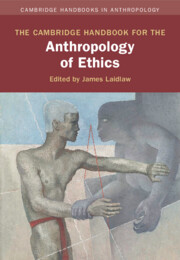Book contents
- The Cambridge Handbook for the Anthropology of Ethics
- Cambridge Handbooks in Anthropology
- The Cambridge Handbook for the Anthropology of Ethics
- Copyright page
- Contents
- Contributors
- 1 Introduction
- Part I Intellectual Sources and Disciplinary Engagements
- Part II Aspects of Ethical Agency
- Part III Media and Modes of Ethical Practice
- Part IV Intimate and Everyday Life
- 22 Care
- 23 Kinship and Love
- 24 Cooperation and Punishment
- 25 Favours
- 26 The Inimical Gaze
- 27 Animals and More-Than-Representational Ethics
- 28 God
- Part V Institutional Life
- Index
- References
23 - Kinship and Love
from Part IV - Intimate and Everyday Life
Published online by Cambridge University Press: 11 May 2023
- The Cambridge Handbook for the Anthropology of Ethics
- Cambridge Handbooks in Anthropology
- The Cambridge Handbook for the Anthropology of Ethics
- Copyright page
- Contents
- Contributors
- 1 Introduction
- Part I Intellectual Sources and Disciplinary Engagements
- Part II Aspects of Ethical Agency
- Part III Media and Modes of Ethical Practice
- Part IV Intimate and Everyday Life
- 22 Care
- 23 Kinship and Love
- 24 Cooperation and Punishment
- 25 Favours
- 26 The Inimical Gaze
- 27 Animals and More-Than-Representational Ethics
- 28 God
- Part V Institutional Life
- Index
- References
Summary
This chapter explores the ethical tension between kinship and love in the realm of self-chosen marriages or ‘love-marriages’ in India. Central to the discussion are notions of personal autonomy as revealed in the deliberations of young people who must contend with normative ideas about acquiescing to marital ‘arrangement’ (by parents, elders, or kin) and who appear to eschew them by seeking to base their self-made kinship on love. In contrast, societal delineations of selfishness and selflessness play an unusually large part in narratives about love-marriages in North India and impose a measure of authenticity of self and of ethical distinctiveness between persons. This chapter seeks to explore the meanings of the ‘selfishness’ of love-marriages ethnographically by identifying bekhudiyat (literally, ‘losing the self’) as a form of self-forgetting that is poignantly linked to experiences of love and marriage in Delhi.
- Type
- Chapter
- Information
- The Cambridge Handbook for the Anthropology of Ethics , pp. 591 - 609Publisher: Cambridge University PressPrint publication year: 2023

